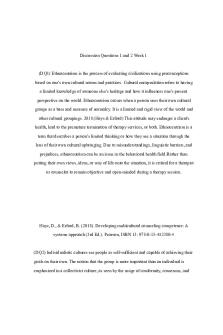Discussion Questions - answers PDF

| Title | Discussion Questions - answers |
|---|---|
| Author | Dakota Cranston |
| Course | Family Law |
| Institution | Queensland University of Technology |
| Pages | 3 |
| File Size | 48 KB |
| File Type | |
| Total Downloads | 28 |
| Total Views | 141 |
Summary
answers...
Description
DISCUSSION QUESTIONS 1. Explain the key differences between negotiation and mediation. Mediation uses independent third parties to help parties generate options to resolve the issues. Negotiation, however, is between the parties negotiating to resolve the issues. 2. You are a lawyer acting for John in a family law dispute. John has been separated from his wife, Janette for 6 weeks and instructs that he has been unable to get Janette to agree to him having any contact with their two children, Kevin and Therese aged 4 and 2. John asks you whether he can go to court to get an order that he can spend time with his children. Advise John on the pre-filing dispute resolution requirements, that is, does he have to take any dispute resolution steps before he goes to court? Section 60I requirements from the Family Law Act 1975 (cth). To comply with this section John must approach a FDRP to organize a mediation with his former partner. FDRP will then issue a 60I certificate.
a.
3. Would you answer be different if: Therese has taken out a domestic violence protection order against John? Mediation may not be appropriate and therefore, it could potentially be exempted in s60I 9(b) Family Law Act 1975 (cth). The mediator will look at if both parties to see if they can negotiate freely (Family Law (FDRP) Regulations 2008 (cth) reg 25(2)).
b.
John wants to go to court to sort out property and financial arrangements not parenting issues?
John would not have to attend compulsory mediation but can use other Family dispute resolution processes to make a ‘genuine effort’ and try to settle to resolve issues.
2. Both John and Janette then attend the family dispute resolution. In the first hour of the session is becomes clear that Janette will not agree to John having any contact with the children as she says that John never attended to the children’s day to day needs when they were together and would be unable to manage them. She also says that she has concerns about his parenting of the children as he has a serious alcohol problem, and the children would not be safe in his care. Janette cannot be swayed and refuses to budge from her initial position of ‘no contact’’ with the children. a) Under section 60I of the Family Law Act do you consider that Janette has made a “genuine effort” to resolve the dispute? Janette has not made a genuine effort as she has not considered an options to settle the dispute with John. b) What short term contact options could you discuss with your client in relation to parenting arrangements that may mean that your client could have contact with the children while he is waiting for a court hearing but that Janette’s concerns in relation to the children’s safety would be addressed? Supervised arrangement privately or a Children’s Contact Centre where John can spend supervised time with his children. Note, long waiting lists for community-based centres, therefore if appropriate, a private centre is recommended. c) If there has been coercive controlling violence in the relationship what type of behaviour would Therese have
been subject to and how might that impact on her ability to negotiate freely in a mediation?
What are the ways in which mediation can be structured to provide a victim of violence with support? If the FDRP assesses the case as not suitable for mediation what are the other dispute resolution alternatives available to Therese and John to resolve these issues?...
Similar Free PDFs

Seminar-Discussion-Questions Answers
- 29 Pages

Discussion Questions - answers
- 3 Pages

Discussion Questions
- 4 Pages

Discussion Questions
- 3 Pages

Chapter 9 - Discussion Answers
- 10 Pages

MST - Discussion Forum Answers
- 14 Pages

EOG Discussion Forum answers
- 4 Pages

Chapter 10 - Discussion Answers
- 11 Pages

Discussion Questions Radiolab
- 1 Pages

Discussion Questions Other Wes
- 3 Pages

Discussion Questions 12
- 1 Pages

Accounting 102 discussion questions
- 25 Pages

Dbq - discussion based questions
- 8 Pages

Chapter 12 Discussion Questions
- 2 Pages

Discussion Questions Week1
- 2 Pages
Popular Institutions
- Tinajero National High School - Annex
- Politeknik Caltex Riau
- Yokohama City University
- SGT University
- University of Al-Qadisiyah
- Divine Word College of Vigan
- Techniek College Rotterdam
- Universidade de Santiago
- Universiti Teknologi MARA Cawangan Johor Kampus Pasir Gudang
- Poltekkes Kemenkes Yogyakarta
- Baguio City National High School
- Colegio san marcos
- preparatoria uno
- Centro de Bachillerato Tecnológico Industrial y de Servicios No. 107
- Dalian Maritime University
- Quang Trung Secondary School
- Colegio Tecnológico en Informática
- Corporación Regional de Educación Superior
- Grupo CEDVA
- Dar Al Uloom University
- Centro de Estudios Preuniversitarios de la Universidad Nacional de Ingeniería
- 上智大学
- Aakash International School, Nuna Majara
- San Felipe Neri Catholic School
- Kang Chiao International School - New Taipei City
- Misamis Occidental National High School
- Institución Educativa Escuela Normal Juan Ladrilleros
- Kolehiyo ng Pantukan
- Batanes State College
- Instituto Continental
- Sekolah Menengah Kejuruan Kesehatan Kaltara (Tarakan)
- Colegio de La Inmaculada Concepcion - Cebu
